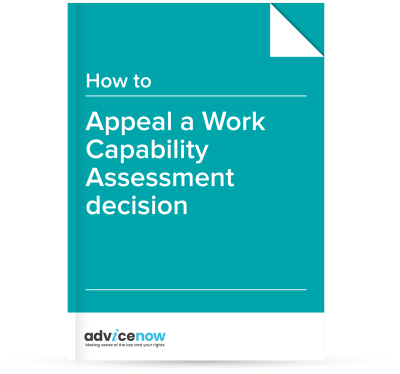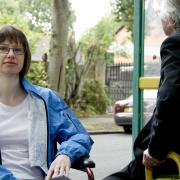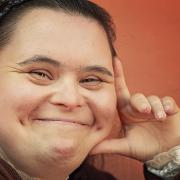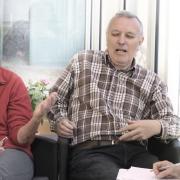Show this page to the people you are asking to write evidence for you.
Remember to mark the descriptors you meet below. Remember that you can only score points for one descriptor (either a, b, c or d) in each of the activities so choose the descriptor that you meet that gives you the most points.
We have written this page for medical staff, social workers, support workers, and other professionals who might be able to tell the tribunal what they need to know. It explains how to write helpful evidence for this kind of benefit appeal.
Evidence from professionals helps the tribunal to come to the right decision more than anything else. Your evidence doesn't need to be long or typed.
This appeal is about a decision that was made on …………………………. [patient to fill in]. Your evidence needs to be about how their condition affected them at that time.
1) Consider if your patient/client could reasonably be expected to manage finding a job, going to work, or doing all the things they need to do in order to claim Jobseeker’s Allowance (or the Universal Credit version of it). Your client can be entitled to these benefits if the panel recognise they face a substantial risk from being found fit to work even if they don’t meet enough of the descriptors below. For example, if they sometimes have seizures, violent outbursts, frequent falls, suicidal thoughts, delusions, or need supervision to stay safe, it would arguably be dangerous for them to be forced to travel and work without supervision. Or if they would be unable to look for jobs, and go to meetings and training on time and without fail (perhaps because of depression or confusion) there is a substantial risk that their benefit payments would stop and they would be unable to feed or care for themselves. If the stress of looking for a job or going to work might make them relapse, that can be counted too.
If you can see that any of this applies to your service user please write in your evidence that ‘Looking for work or working poses a substantial risk to the health and well-being of [name of patient/client] because of….’
2) Consider if your patient/client could reasonably be expected to manage going to the meetings and training sessions they need to in order to continue getting the benefit if they are put in the ‘work-related activity group’ (in ESA) or ‘limited capability for work’ group (in Universal Credit). If you are concerned that they will not manage it, include a sentence along the lines of ‘Being obliged to do work-related activity also poses a substantial risk to their health and well-being because of….’
3) Confirm which of the descriptors below they meet. Your patient/client has marked which descriptors they think they meet below. Please confirm all those that you can in your evidence. For example, if they cannot walk into your consulting room without discomfort, or if they are slow and it takes them twice as long as somebody else, please say that.
If you cannot confirm the descriptor your patient has marked but can confirm another in that activity, please include that. If you cannot confirm any from that activity, please just leave it out as your patient may have evidence from someone else who knows more about their problems with this. If you don’t understand why your patient meets the descriptor they have indicated, please ask them.
If your patient/client could do the activity described but not for a reasonable, continuous period, or sometimes, but not on most days, it counts as being unable to do it. For example, if they can stand and walk for 50 meters, but they can only do it a few times in a day, it hurts them, or they wouldn’t be able to do it the next day, the law sees this as not being able to walk for 50 metres.
This appeal is about a decision that was made on …………………………. [patient to fill in]. Your evidence needs to be about how their condition affected them at that time.
4) If you are a medical professional, please also confirm any diagnosis or treatment.
Physical disabilities
Activity 1: Moving around without the help of another person – including using a walking stick, manual wheelchair or other aid you could use.
Descriptors:
(a) Cannot move more than 50 metres on level ground without stopping in order to avoid significant discomfort or exhaustion, or cannot repeatedly move 50 metres within a reasonable timescale because of significant discomfort or exhaustion - 15 Points
(b) Cannot go up or down two steps without the help of another person, even with the support of a handrail - 9 Points
(c) Cannot move more than 100 metres on level ground without stopping in order to avoid significant discomfort or exhaustion, or cannot do it repeatedly within a reasonable timescale because of significant discomfort or exhaustion - 9 Points
(d) Cannot move more than 200 metres on level ground without stopping in order to avoid significant discomfort or exhaustion, or cannot do it repeatedly within a reasonable timescale because of significant discomfort or exhaustion - 6 Points
Activity 2: Standing and sitting
Descriptors:
(a) Cannot move between one seated position and another seated position located next to one another without receiving physical help from another person -15 Points
(b) Cannot, for the majority of the time, remain at a work station, either:
(i) standing without help from another person (even if free to move around); or (ii) sitting (even in an adjustable chair) for more than 30 minutes, before needing to move away in order to avoid significant discomfort or exhaustion -9 Points
(c) Cannot, for the majority of the time, remain at a work station, either:
(i) standing unassisted by another person (even if free to move around); or (ii) sitting (even in an adjustable chair) for more than an hour before needing to move away in order to avoid significant discomfort or exhaustion - 6 points
Activity 3: Reaching
Descriptors:
(a) Cannot raise either arm as if to put something in the top pocket of a coat or jacket - 15 Points
(b) Cannot raise either arm to top of head as if to put on a hat - 9 Points
(c) Cannot raise either arm above head height as if to reach for something - 6 Points
Activity 4: Picking up and moving or things using your upper body and arms
Descriptors:
(a) Cannot pick up and move a 0.5 litre carton full of liquid - 15 Points
(b) Cannot pick up and move a one litre carton full of liquid - 9 Points
(c) Cannot transfer a light but bulky object such as an empty cardboard box - 6 Points
Activity 5: Manual dexterity
Descriptors:
(a) Cannot press a button or turn the pages of a book with either hand - 15 Points
(b) Cannot pick up a £1 coin with either hand - 15 Points
(c) Cannot use a pen or pencil to make a meaningful mark - 9 Points
(d) Cannot use a suitable keyboard or mouse - 9 Points
Activity 6: Making yourself understood through speaking, writing, typing, or other means, without help from someone else
Descriptors:
(a) Cannot convey a simple message, such as the presence of a hazard - 15 Points
(b) Has significant difficulty conveying a simple message to strangers - 15 Points
(c) Has some difficulty conveying a simple message to strangers - 6 Points
Activity 7: Understanding communication by either verbal means (such as hearing or lip reading) and non-verbal means (such as reading large print), using anything to help that you could use (glasses, hearing aid etc), without help from someone else
(For the descriptors below, you only have to show that you have difficulty or are unable to understand a spoken or written message, and not both).
Descriptors:
(a) Cannot understand a simple message due to sensory impairment, such as the location of a fire escape - 15 Points
(b) Has significant difficulty understanding a simple message from a stranger due to sensory impairment - 15 Points
(c) Has some difficulty understanding a simple message from a stranger due to sensory impairment - 6 Points
Activity 8: Finding your way and being safe, using a guide dog or other aid if normally used
Descriptors:
(a) Unable to find your way around familiar places, without the help of another person, due to sensory impairment - 15 Points
(b) Cannot safely cross the road (or complete another potentially dangerous task), without the help of another person, due to sensory impairment - 15 Points
(c) Unable to find your way around unfamiliar places, without the help of another person, due to sensory impairment - 9 points
Activity 9: Extensive incontinence (other than bed-wetting) despite using any aids normally used
Descriptors:
(a) At least once a week experiences loss of control leading to incontinence, or substantial leakage of the contents of a collecting device, so that you need to wash and change your clothes -15 Points
(b) At least once a month experiences loss of control leading to incontinence, or substantial leakage of the contents of a collecting device, so that you need to wash and change your clothes -15 Points
(C)At risk of incontinence, bad enough for you to need to wash and change your clothes, if you are not able to reach a toilet quickly - 6 Points
Activity 10: Consciousness during waking moments
Descriptors:
(a) At least once a week, has an involuntary episode of lost or altered consciousness that causes significant reduction in awareness or concentration - 15 Points
(b) At least once a month, has an involuntary episode of lost or altered consciousness that causes significant reduction in awareness or concentration - 6 Points
Mental, cognitive and intellectual function
Activity 11: Learning tasks
Descriptors:
(a) Cannot learn how to complete a simple task, such as setting an alarm clock - 15 Points
(b) Cannot learn anything beyond a simple task, such as setting an alarm clock - 9 Points
(c) Cannot learn anything beyond a moderately complex task, such as the steps involved in operating a washing machine - 6 Points
Activity 12: Awareness of everyday hazards (such as boiling water or sharp objects)
Descriptors:
(a) Reduced awareness of everyday hazards so that there is a significant risk that they will hurt themselves or others, or damage property or possessions, so that they need supervision most of the time to stay safe - 15 Points
(b) Reduced awareness of everyday hazards so that there is a significant risk that they will hurt themselves or others, or damage property or possessions, so that they need frequent supervision to stay safe - 9 Points
(c) Reduced awareness of everyday hazards so that there is a significant risk that they will hurt themselves or others, or damage to property or possessions, so that they occasionally need supervision to stay safe - 6 Points
Activity 13: Initiating and completing personal action (which means planning, organisation, problem solving, prioritising or switching tasks without needing prompting from somebody else)
Descriptors:
(a) Cannot, due to impaired mental function, reliably initiate or complete at least 2 sequential personal actions.
15 Points
(b) Cannot, due to impaired mental function, reliably initiate or complete at least 2 personal actions for the majority of the time.
9 Points
(c) Frequently cannot, due to impaired mental function, reliably initiate or complete at least 2 personal actions.
6 Points
Activity 14: Coping with change
Descriptors:
(a) Cannot cope with any change to the extent that day to day life cannot be managed - 15 Points
(b) Cannot cope with minor planned change (such as a pre-arranged change to the routine time scheduled for a lunch break), to the extent that overall day to day life is made significantly more difficult - 9 Points
(c) Cannot cope with minor unplanned change (such as the timing of an appointment on the day it is due to occur), to the extent that overall, day to day life is made significantly more difficult - 6 Points
Activity 15: Getting about
Descriptors:
(a) Cannot get to any specified place with which the claimant is familiar -15 Points
(b) Is unable to go to a familiar place without being accompanied by another person - 9 Points
(c) Is unable to go to an unfamiliar place without being accompanied by another person - 6 Points
Activity 16: Coping with social engagement due to cognitive impairment or mental disorder
(This is about your ability to interact with people in face-to-face social situations. It must be more than shyness or reticence.)
Descriptors:
(a) Engagement in social contact is always impossible due to difficulty relating to others or significant distress experienced by the individual - 15 points
(b) Engagement in social contact with someone unfamiliar is impossible due to difficulty relating to others or significant distress experienced by the individual - 9 Points
(c) Engagement in social contact with someone unfamiliar is not possible for the majority of the time due to difficulty relating to others or significant distress experienced by the individual - 6 Points
Activity 17: Appropriateness of behaviour with other people, due to cognitive impairment or mental disorder
Descriptors:
(a) Has, on a daily basis, uncontrollable episodes of aggressive or disinhibited behaviour that would be unreasonable in any workplace - 15 Points
(b) Frequently has uncontrollable episodes of aggressive or disinhibited behaviour that would be unreasonable in any workplace - 15 Points
(c) Occasionally has uncontrollable episodes of aggressive or disinhibited behaviour that would be unreasonable in any workplace - 9 Points
Activity 18: Conveying food or drink to the mouth
If any of the below descriptors apply, you should automatically be put in the support group (ESA) or Limited capability for work-related activity group (Universal Credit).
(a) Cannot get food or drink to own mouth without physical help from someone else
(b) Cannot get food or drink to own mouth without repeatedly stopping, experiencing breathlessness or severe discomfort;
(c) Cannot get food or drink to own mouth without needing somebody with you to regularly prompt or remind you
(d) Fails to get food or drink to own mouth without receiving either physical help from somebody else or needing somebody with you to regularly prompt or remind you, because of a severe disorder of mood or behaviour
Activity 19: Chewing or swallowing food or drink
If any of the below descriptors apply, you should automatically be put in the support group (ESA) or Limited capability for work-related activity group (Universal Credit).
(a) Cannot chew or swallow food or drink
(b) Cannot chew or swallow food or drink without repeatedly stopping, experiencing breathlessness or severe discomfort
(c) Cannot chew or swallow food or drink without needing somebody with you to repeatedly and regularly prompt or remind you
(d) Fails to chew or swallow food or drink or fails to do so without needing somebody with you to regularly prompt or remind you, because of a severe disorder of mood or behaviour


 “They said I was well enough to work”
“They said I was well enough to work”



 provided advice and feedback on this guide, particularly David Shah who peer reviewed this edition of the guide.
provided advice and feedback on this guide, particularly David Shah who peer reviewed this edition of the guide.